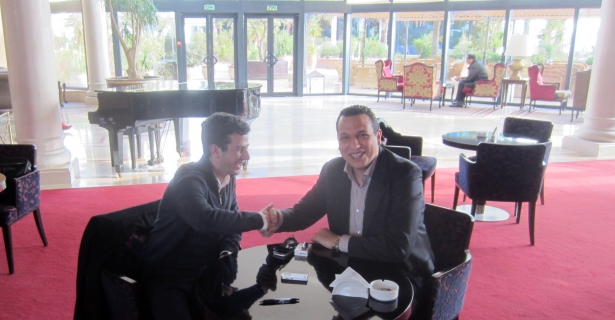Written by Bradley Friedman, EPIIC 2014
Since arriving in Tunis we’ve met with various students and civil society activists working to improve the entrepreneurial ecosystem. Many agreed with the belief we came to learn from EPIIC that entrepreneurship provides a solution to the extremely high unemployment rates in Tunisia. We’ve received estimates that unemployment rate hovers around 40%, and can be even higher in the interior regions. Then we met Ali Mnif, a serial entrepreneur, who said we got it all wrong.
Ali Mnif, like most Tunisians we interviewed, planned to move abroad after his studies because of corruption. During his rule, most businesses were required to have ties with former autocratic leader Zine El Abidine Ben Ali. If your business became too big he and his wife’s extended family would “eat it up.” Before the revolution Ali Mnif came to America on a University of Michigan Business School Fellowship to receive training and he took the opportunity to travel to entrepreneurial ecosystems such as Boston and Silicon Valley. In both cases he was shocked at the huge linkages between the universities and the business centers (Biotech in Boston, high tech in Silicon Valley). Shortly after the revolution Ali realized that the opportunity to start a company now existed, but it wasn’t an equal opportunity. So he started a company that organized networking events in Paris with his few contacts, and was soon exposed to the greater Tunisian diaspora of successful businessmen in France and United States. At the same time his company managed entrepreneurial-related projects for foreign governments, such as the U.S. Department of State, who were eager to promote entrepreneurship in Tunisia.
Right away Ali noticed that the effort was misguided. Rather than attracting the best talent, who were working in large corporations in Tunisia and the type of talent he saw in Silicon Valley, these programs received unemployed youth who just had an idea. Ali argues they lack the entrepreneurial mindset, they lack networks and finances, and they lack the appropriate skills to succeed. Therefore, Ali thinks that to just direct the unemployed to start businesses is naïve and explains why there hasn’t been much success yet. Without building the ecosystem, Ali thinks these programs will continue to operate in a vacuum.
The next morning we met with Chéma Gargouri, Country Director of IIE as well as President of Women’s Enterprise for Sustainability (WES), who confirmed Ali’s skepticism of the NGO’s entrepreneurship initiatives. She said that since the revolution “entrepreneurship” became the buzzword and every week it seems there’s some sort of entrepreneurship competition, but then nothing happens. In some cases, the winners get funding, but then one to two years later, the company fails. Why does this occur? She believes that the entrepreneurial culture doesn’t exist in Tunisia. She argues that for generations everything was given to Tunisians. Primary school to graduate school is free for Tunisians. Under Ben Ali many students would then work for the government. Consequently she believes the youth feel entitled and expect everything to given to them.
Her solution is to design sustainable and inclusive frameworks. WES has Women Business Centers in six cities in Tunisia that provides training and mentoring for women. However, in each center the women who receive training have to pay a small stipend for the services. By building incentives into the structures, she found that the participants become more involved and invested in the success of the center and greater community. This makes the centers sustainable once the grant money dries up. Despite the greater challenges that remain, the impact on women’s lives convinces her that Tunisia is on the right path.

